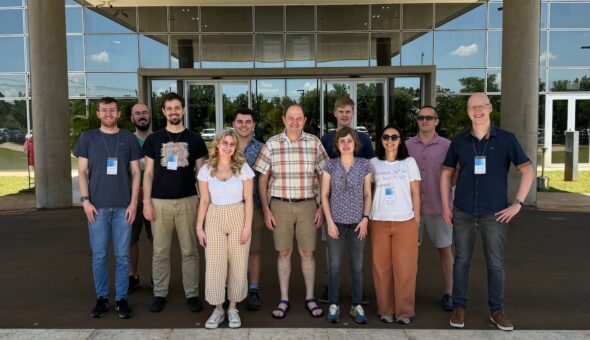Over the summer of 2023 I had the opportunity to go on a 6-week research visit hosted by Thomas Pock at the Institute of Computer Graphics and Vision in the Graz University of Technology (TU Graz), Austria. I had met Tom twice before - once at a conference in Edinburgh where he expressed interest in my poster, and again at a workshop in Rome where he gave a talk on bilevel learning - the topic of my PhD. At the end of his talk, he mentioned that if anyone is interested in bilevel learning he is happy for them to get in touch. A few months later I (with the blessing of my supervisors) reached out to Tom, asking if he would be willing to host me for a research visit. Much to my horror, I got a response mere hours later saying “Sure, you are always welcome!”.
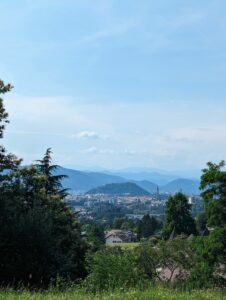
I had never stayed outside the UK for more than a week. How does this work? Housing contracts? Visas? Do I bring my wok? Over the following months, after much searching online and emailing the wrong people, all was revealed to me. It did soon dawn on me that I needed to both: hand my passport over to an Austrian embassy where they will hold it for a suggested 15 (but technically unbounded) number of days; and have my passport to attend a conference in Seattle, USA. To halt my exponentially increasing levels of stress and avoid gambling my entire trip to Seattle, I decided to sort out my visa after Seattle and so began my research visit a few weeks later than planned but added a couple of days at the end to compensate.
To be honest I wasn’t wholly sure what you are expected to do during a research visit. After asking one of my supervisors, it turns out you usually either start a new research project or get a new perspective on an ongoing project. Tom had a few ideas, but we agreed before I arrived that we will focus on a new research project related to bilevel learning (the area of my PhD). Bilevel learning is a challenging nested optimisation problem, by which I mean you want to minimise some cost function where some of the quantities in said function are solutions to another minimisation problem that also depend on the thing you’re originally trying to minimise with respect to. With Tom we started to consider a bunch of tractable approximations of the bilevel problem, making comparisons both between them and to the original problem itself.
Soon the day was upon me, and I was on my flight enroute to Graz. It turns out that Graz airport is tiny - we were the only plane and there was no security or border control. You simply walk out without disruption which did feel very unusual, but I rolled with it. On the connecting train to Graz city itself I immediately saw people dressed in Lederhosen and Dirndl. This is it. I am in Austria.
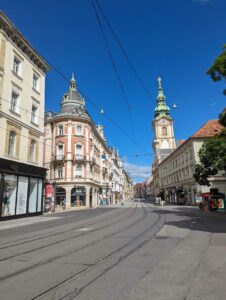
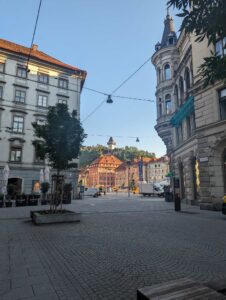
Graz is a wonderful city. Despite being the biggest city in Austria after Vienna, it didn’t give off huge-city-energy and overall it was very charming. They have a tram line which I always find very exciting, but the main attraction is the Schlossberg - an old fortress atop the hill in the centre of the city, which nowadays is used as a public park. Over the course of my time in Graz, I visited various museums and galleries in and around the area. I distinctly remember being in the Landeszeughaus, the Styrian Armoury, and hearing some fantastic sounds coming outside. Upon further investigation I realised that an orchestra was warming up in the Landhaus Courtyard next door. I then witnessed what I could only describe as a band-off between two orchestras, each playing pieces of music and trying to one-up another. Various orchestral versions of songs from the Jungle Book were performed and I had a wonderful time.
The buildings in Graz are usually either exquisitely and intricately detailed, or large blocks of brutalist concrete. While the the city centre tends to have the more fanciful design, the institute I was working at in TU Graz adopted the latter design, featuring grated walkways between buildings and all. Each office holds usually just 2 PhD students, featuring dual monitor setups and large spacious desks, which is in contrast to Bath where there’d be around 10 students per office. The general approach of supervision was also in contrast to how I was used to it in Bath. At Bath I have a weekly scheduled meeting with my supervisors, whereas at TU Graz it very much seems to be more spontaneous in nature, wherein you pop into your supervisor’s office whenever you have a question. The fact that Tom’s office is directly next to his PhD students’ offices no doubt helped in this regard.
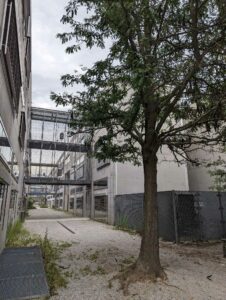
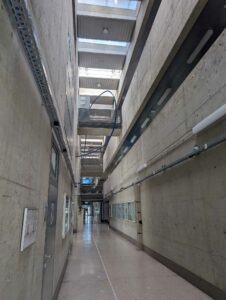
The people I met at TU Graz were all so incredibly friendly and welcoming. The twice a day scheduled coffee breaks and lunch offered an opportunity to socialise and get to know more than just your officemate. I had actually met two of the PhD students before at a workshop the previous year - the one where I also met Tom. At the end of the workshop one of them told me that if I am ever in Austria, I should go climbing with him. At the time I politely accepted, thinking that, while I would absolutely be interested, such an opportunity would never actually arise. Yet there I was, in the same institute and I am glad to say that we did in fact go climbing together.
Almost everyone I met in Austria spoke excellent English and, while I did GCSE German, it had been a number of years since I had spoken any, but I was determined to have a full conversation before I left. Duolingo came in to save the day and, while I sometimes got confused looks from people at TU Graz for saying some German-but-not-Austrian-German phrases, I would call it a success. Indeed, I had a lovely conversation to my officemate about their holiday. Thankfully she understood that I knew barely any German so actually gave responses that were simple enough for me to understand. Others were not this merciful which resulted in me doing wholly unjustified levels of extrapolation to figure out what they might be saying. One thing to know about Austria is that during any mealtime your are obligated to say “mahlzeit” to any and everyone who goes near you. This means mealtime and is something I soon picked up on.
My non-fluency in German did give rise to a few interesting interactions with some of the locals. One time I was queueing up to place my shopping on a conveyor belt in Lidl, and an elderly person in front of me was being a bit slow at moving their shopping from their basket. For context they were not slow by English standards, but rather the cashiers in Austrian Lidl’s scan items at a frightening speed (this is possibly the biggest culture shock I had while in Austria and it caught me completely off guard). Anywho, they turned to me and spoke at length in German. The only word I picked up on was “helfe” which if my GCSE German brain knowns anything means help. I figured they were asking me to aid them in moving their shopping, so I rose to the challenge, replying “ja, kein problem!”, and began to move their groceries. This did not shock them, and they said thank you after I had finished so I’m assuming I understood them correctly even if I did not understand them. Another time I was stopped in the street by a gentleman who eventually picked up that I did not understand what he was saying. It turns out somebody had broken down in their car on the tramline and needed help in getting their car moved out of harm’s way. Perhaps unsurprisingly, two people pushing a car up onto a pavement curb by hand is quite difficult - but we did manage. Soon a tram arrived, and it became apparent that there was still not enough space for the tram to get by. We then had to push the car in the opposite direction, tram waiting behind us, and move the car down the road and round the nearest corner. By this time there were 4 of us pushing the car which made things slightly easier. Nevertheless, it was a memorable moment.
I spent my research stay living in a little private flat in a student apartment block. After initially unpacking on my first day, it dawned on me that this was going to be my life for the next month-and-a-half. Not being sure whether I had made a good decision nor if I was going to enjoy my time in Austria, I did feel quite lonely and uncertain that first evening, but I soon found my footing and developed a routine and made friends. Indeed, I befriended some people who were living in the same accommodation building, and even decided to go on a one-day trip to Maribor in Slovenia with one of them who, up until that trip, I had never actually met before. But how often do I have the chance of going to a new country with someone I’ve never met before? We ended up having a wonderful time and having lived in the UK my entire life, I never really acknowledged how easy it can be to enter different countries in mainland Europe. You can simply get on a train… and then get off a train. Absolutely incredible.
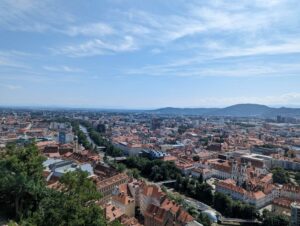
One spanner in the works during my visit is that, about half-way in, I got a call from my bank telling me that my card had been compromised and consequently the account was frozen. Thankfully this was only my international-spending card I had gotten specifically for the visit, and my main UK card was unaffected. Feeling deterred from using my UK card however, I decided to go cash-only for the rest of my visit, which I did in fact manage to do with 10 Euros spare by the end. Despite this set back, I still managed to spend my final Saturday in Vienna, exploring the capital of Austria.
Eventually my time in Austria was nearing an end and, in the evening of the penultimate research day, everyone I’d met at the institute came out for farewell drinks at a bar on a market square near the city centre. It was a lovely evening, and I feel indicative that I managed to integrate well at the institute, establishing meaningful connections. At the end of the final day of research in Austria I said my farewells to the people of the institute and then that was it. Research stay over.
It feels surreal that I have gone and lived in another country for several weeks. Although I know many people who have done or currently do precisely that, I never actually thought I would have the opportunity nor feel capable of doing so. While I have continued with the research project that was started in Austria, being able to visit and integrate with the culture and the people there was a fantastic experience, and one I am so glad I pursued!
Respond

